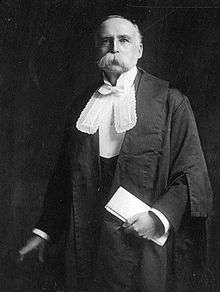Frederic Lang
| The Honourable Sir Frederic Lang | |
|---|---|
 | |
| 8th Speaker of the House of Representatives | |
|
In office 1913–1922 | |
| Prime Minister | William Massey |
| Preceded by | Arthur Guinness |
| Succeeded by | Charles Statham |
| Member of the New Zealand Parliament for Waipa | |
|
In office 1893 – 1896 | |
| Preceded by | In abeyance |
| Succeeded by | In abeyance |
| Member of the New Zealand Parliament for Waikato | |
|
In office 1896 – 1905 | |
| Preceded by | Alfred Cadman |
| Succeeded by | Henry Greenslade |
| Member of the New Zealand Parliament for Manukau | |
|
In office 1906–1922 | |
| Preceded by | Matthew Kirkbride |
| Succeeded by | William Joseph Jordan |
| Personal details | |
| Born |
Frederic William Lang 1852 Blackheath, Kent, England |
| Died |
5 March 1937 Onehunga, New Zealand |
| Political party | Reform |
Sir Frederic William Lang (1852 – 5 March 1937) was a New Zealand politician, initially an independent conservative, then from 1914 a member of the Reform Party. He was the eighth Speaker of the House of Representatives, from 1913 to 1922.
Early life
Lang was born in Blackheath, Kent, England in 1852.[1] He emigrated to New Zealand as a young man and settled in Tuhikaramea near present-day Temple View. He played football and represented the Auckland Province. He never married.[1]
Around 1906, he sold his farm and moved to Onehunga.[1]
Political career
| Parliament of New Zealand | ||||
| Years | Term | Electorate | Party | |
| 1893–1896 | 12th | Waipa | Independent | |
| 1896–1899 | 13th | Waikato | Independent | |
| 1899–1902 | 14th | Waikato | Independent | |
| 1902–1905 | 15th | Waikato | Independent | |
| 1906–1908 | 16th | Manukau | Independent | |
| 1908–1911 | 17th | Manukau | Independent | |
| 1911–1914 | 18th | Manukau | Independent | |
| 1914–1919 | 19th | Manukau | Reform | |
| 1919–1922 | 20th | Manukau | Reform | |
Lang's political career started with his election to the Tuhikaramea Road Board. He was elected onto the Waipa County and became its chairman. He also belonged to the Waikato Charitable Aid Board.[1]
He was the Member of Parliament for Waipa from 1893 to 1896; then Waikato from 1896 to 1905 when he was defeated; then Manukau from 6 December 1906 until 1922, when he was defeated.[2] He was Chairman of Committees from 1912 to 1913.[3] He then became Speaker of the House of Representatives from 1913 to 1922.[4]
In 1913 as speaker, in response to filibusting by Apirana Ngata, Lang introduced a rule that MPs who could speak in English must not speak te reo Māori and by 1920 Parliament no longer employed translators. The situation was reversed in the 1980s with the Māori Renaissance and the Maori Language Act 1987.[5]
He was knighted in 1916.[2] He was appointed to the Legislative Council in 1924 and served for one term until 1931.[6] In 1935, he was awarded the King George V Silver Jubilee Medal.[7]
Death
He died at his home in Onehunga on 5 March 1937.[8]
Notes
- 1 2 3 4 "Sir Frederic Lang". The Evening Post. CXXIII (54). 5 March 1937. p. 10. Retrieved 5 December 2013.
- 1 2 Wilson 1985, p. 211.
- ↑ Wilson 1985, p. 252.
- ↑ Wilson 1985, p. 250.
- ↑ "Launch of Simultaneous Interpretation in the House". New Zealand Parliament. Retrieved 18 July 2012.
- ↑ Wilson 1985, p. 157.
- ↑ "Official jubilee medals". The Evening Post. 6 May 1935. p. 4. Retrieved 16 November 2013.
- ↑ "Deaths". Auckland Star. 5 March 1937. p. 1. Retrieved 16 November 2013.
References
- Scholefield, Guy, ed. (1925) [First published in 1908]. Who's who in New Zealand and the western Pacific (2nd ed.). Masterton: Guy Scholefield.
- Wilson, James Oakley (1985) [First published in 1913]. New Zealand Parliamentary Record, 1840–1984 (4th ed.). Wellington: V.R. Ward, Govt. Printer. OCLC 154283103.
- Wood, G. A. (1996) [First published in 1987]. Ministers and Members in the New Zealand Parliament (2nd ed.). Dunedin: University of Otago Press. pp. 95, 114. ISBN 1-877133-00-0.
| Political offices | ||
|---|---|---|
| Preceded by James Colvin |
Chairman of Committees of the House of Representatives 1912–1913 |
Succeeded by Alexander Malcolm |
| Preceded by Arthur Guinness |
Speaker of the New Zealand House of Representatives 1913–1922 |
Succeeded by Charles Statham |
| New Zealand Parliament | ||
| Vacant Constituency recreated after abolition in 1890 Title last held by John Bryce |
Member of Parliament for Waipa 1893–1896 |
Vacant Constituency abolished, recreated in 1954 Title next held by William Goosman |
| Preceded by Alfred Cadman |
Member of Parliament for Waikato 1896–1905 |
Succeeded by Henry Greenslade |
| Preceded by Matthew Kirkbride |
Member of Parliament for Manukau 1906–1922 |
Succeeded by Bill Jordan |